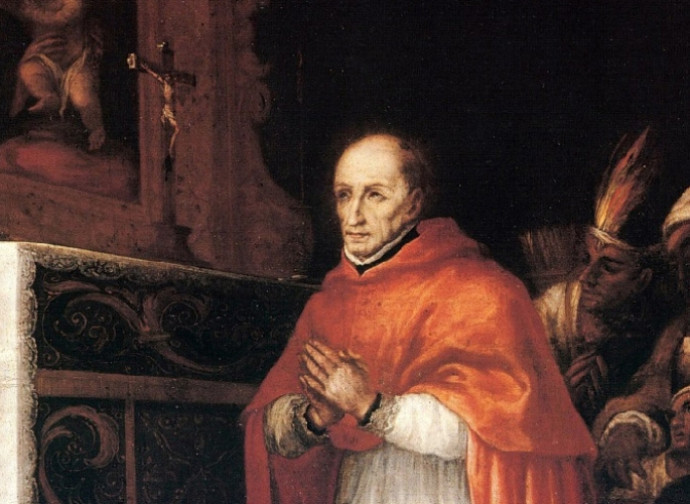Saint Turibius of Mogrovejo
Twenty-five years of episcopal ministry in the New World, and thousands of kilometres travelled almost always on foot to proclaim Christ to the indigenous people of Peru (and beyond), where the fruits of his boundless charity are still reaped. Saint Turibius of Mogrovejo (1538-1606) was born into a noble family in Mayorga, in northern Spain.

Twenty-five years of episcopal ministry in the New World, and thousands of kilometres travelled almost always on foot to proclaim Christ to the indigenous people of Peru (and beyond), where the fruits of his boundless charity are still reaped. Saint Turibius of Mogrovejo (1538-1606) was born into a noble family in Mayorga, in northern Spain. After his legal studies he became a professor of law in Salamanca and was then called to preside over the Inquisition Tribunal of Granada. Knowing his virtues, King Philip II proposed him as possible Archbishop of Lima to Gregory XIII, and in 1579 the Pope authorized the appointment of Turibius, who was then still a layman just over forty years old. The jurist took seriously the very high office to which he had been called and within a few months he was ordained priest and then consecrated bishop. At that point everything was ready for his departure to America.
On 12 May 1581 Turibius took possession of the archiepiscopal see of Lima, which had been without a guide for six years and was in a situation of serious moral decadence: the Spanish viceroys intervened in ecclesiastical matters, giving rise to frequent disputes between temporal and spiritual power, while few religious intervened to correct abuses. The saint's work was instead immediately energetic, aimed at raising the Church from its subjugation. To those who justified themselves by saying “this was the custom here”, he replied: “Christ is Truth and not custom”. He had to face disputes and ordeals, but Turibius was not discouraged because he was aware of his mission: “The only one whom we must always make happy is Our Lord”.
He promoted the reform of the clergy and barely a year after his arrival he convened the Third Council of Lima (1582-1583), in which prelates from all over Spanish America participated and in which fundamental questions were addressed, concerning the evangelization of the Indians, catechesis and preaching in the native languages. The saint himself learned to speak the major local idioms and had the Catechism printed in Spanish, Quechua and Aymara, skilfully dividing the catechetical teaching into courses for children, young people, illiterate adults and educated people. In 1591 he founded the first American seminary in Lima, which today bears his name, and during his episcopate the number of parishes increased from 150 to 250, thanks to his contacts with Franciscan and Dominican missionaries in the New Continent. No less important was his work in implementing the directives of the Council of Trent.
Thanks to his solicitude, roads, schools, hospitals, convents and churches were built, from which the entire immense territory of his archbishopric, the Metropolitan See whose jurisdiction at the time extended well beyond the borders of Peru, could benefit. He spent about half of his 25 years of episcopacy tirelessly traveling through those lands, giving the sacrament of Confirmation to tens of thousands of Christians, including three future saints: Martin of Porres, Francis Solano and Rose of Lima. The first American to be canonized was called “Rose” by Turibius himself. With his passionate preaching and his charity (he went so far as to donate his own clothes to the needy and spared no expense in caring for the sick) he was a father figure to countless natives, whom he visited in their huts to introduce them to Christ. The thought of heavenly goods was in fact the engine of his daily life: “Our great treasure is the present moment. We must take advantage of it to earn eternal life. The Lord God will duly take into account how we have spent our time”.
Patron of: Indians, South American bishops
